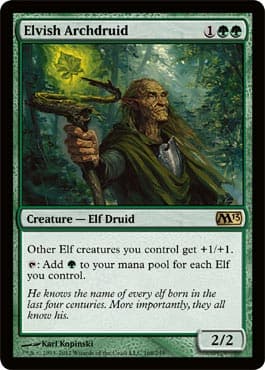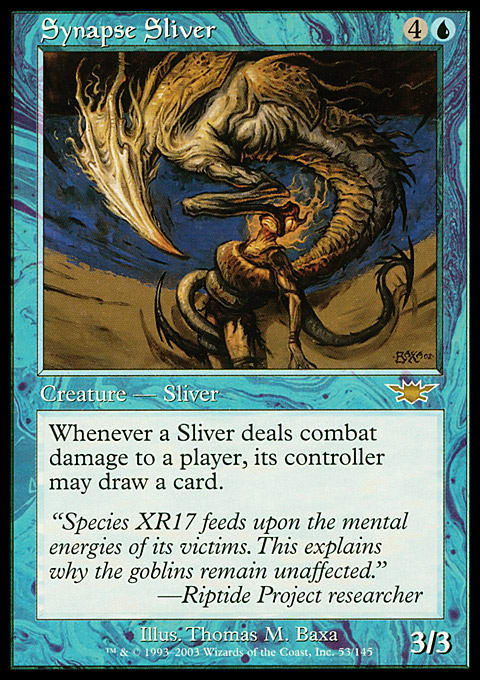Magic is a very difficult thing to explain. Not just the actual rules—I don’t even make it that far. I’m talking about trying to explain Magic as an important part of your life.
As I become increasingly involved with the community, the people I know are growing more curious about what I’m doing. These are professors, fellow students, relatives—nongamers.
For a long time, I had no idea how to communicate the power of the game. Gavin Verhey framed it in terms of the benefits that a pro player experiences, but that’s not an accurate reflection of the average Magic player’s experience. I tried explaining the mechanics or the flavor, hoping to spark some of the awe that I first felt when discovering the game, but I was answered only by benignly puzzled smiles.
Then it occurred to me: When those mechanics and flavor first drew me in, I was fourteen years old. When I described them, I was trying to communicate a young teenager’s sense of wonder to adults. What I got out of the game then was completely different from what I get now and from these other people would be likely to be interested in.
So what was I getting out of the game now that I’m in my mid-twenties? And the answer came to mind immediately: a sense of community. To me, the community is key; I’m not the kind of person who sits at home planning new decks or playing Duels of the Planeswalkers. In my mind, to play Magic is to talk about Magic, to write about Magic, and to get together and celebrate it.
Now, when nongamers ask about the game, I instead talk about the community. I know that my well-being is linked to how connected I’m feeling to my communities of choice, and research bears this out (Nowell & Boyd 834). It seems that most people had no idea what a rich, connected culture surrounds this (relatively) simple game.
According to researchers, “Sense of community is a feeling that members have of belonging, a feeling that members matter to one another and to the group, and a shared faith that members' needs will be met through their commitment to be together” (McMillan 1976, qtd. in McMillan & Chavis 9).
They broke the sense of community into four separate elements: membership, integration and fulfillment of needs, influence, and a shared emotional connection. To understand (and explain) what the community does for you, it helps to look at these elements one by one:
Element 1: Membership
How do we fit in?
Membership may be the most straightforward of the four elements. As one researcher points out, the idea of the in-group “ . . . intuitively seems to be a necessary part of any definition of community; to have a sense of community, one must first belong to a community” (Obst, Zinkiewicz, & Smith 89). However, real membership goes beyond artificial boundaries and labels. The concept encompasses several different factors that all contribute to a general feeling of belonging.
Self-identification is an important one—the fact that you play Magic doesn’t mean you identify with the group. In my Geek Shame article, I talked about how, when something like Magic is a passion of yours, it becomes a significant part of your identity. Likewise, the strong sense of group identity is an important part of membership. Not only are you a Magic player, but you can confidently say that Magic players are “your group” (McMillan & Chavis 10).
That’s not really something you can say lightly. Investment is a key part of membership, and Magic is nothing if not an investment. We invested time and energy in learning a complex game and in seeking out a community to play in. We earned our spot there, and that makes both us and the people around us value our connection (McMillan, qtd. in McMillan & Chavis 10).
Element 2: Integration and Fulfillment of Needs
How do we help each other?
When I first read this section, I was confused by the integration part of integration and fulfillment of needs. Fulfillment of needs (or wants) made sense to me when I thought about my relationship with the community—I want a fun hobby, and the Magic community provides that. I want like-minded people to make friends with. I want a fun and encouraging environment to practice my writing and research skills. Clearly, many of my needs are being met. But what is this integration?
It became clear in the very last line of the section: “A strong community is able to fit people together so that people meet others' needs while they meet their own.” (McMillan & Chavis 13). When two people come together to play, it’s not as if one is doing the other a favor—each needs an opponent, so their needs are in balance.
Likewise, new players need experienced players to show them the ropes (and often to provide them with their first cards), but experienced players need new players to keep the game alive. Local game stores and online communities connect people who wouldn’t otherwise be connected, giving people a chance to find what they need and share what they have.
It is becoming increasingly easy to find examples of people reaching a hand out to others within the community. Gamers Helping Gamers has begun distributing its scholarships. Last Saturday, a store ran a tournament to benefit a regular player who had been in a serious car accident. Magic already has a fairly strong sense of community for most people, but this is the area where I really anticipate seeing growth in the years to come.
Element 3: Influence
How do we affect each other?
Like the integration of needs, influence works both ways. Researchers report that a person needs to have some sway over the group in order to feel attracted to it. On the other hand, the group can’t be controlled entirely by the scattered whims of the members—to maintain coherence, there needs to be a flow back and forth between the individuals and the group (McMillan & Chavis 11).
Although group influence is often associated in people’s minds with peer pressure and forced conformity, not all group influence is bad. People are reassured by knowing that they share opinions with others and will align themselves with peers as much out of a personal desire for agreement as out of overt pressure (McMillan & Chavis 12).
If you choose your peer group carefully, this can provide stability and validation. Note the “carefully”—I picked up some unfortunate sexist habits during college that took years to shed. But for the most part, my Magic peers share values that are important to me—values like intellectualism, authenticity, and playfulness—and provide a gentle push back on track when I have moments of doubt.
However, it is also important for people to feel that they can be heard if the current situation really isn’t suiting them. For a community to be strong, there needs to be room for healthy individual differences. Being able to share your opinion and band with like-minded members creates a feeling of ownership that really makes this community ours (McMillan & Chavis 12).
Element 4: Shared Emotional Connection
How do we bond?
Finally, there’s the purely emotional component. An important part this is the idea of shared history. On one level, this can be a personal history: time you’ve spent interacting directly with other community members. I’ve made many close friends through Magic, both through repeated exposure and through going through difficult, tournament-based experiences together.
Unsurprisingly, positive interactions create strong bonds (Cook, qtd. in McMillan & Chavis 13). More interesting is the fact that the group members don’t necessarily need to experience the events directly. If they identify with it, they can be considered to be sharing it (McMillan & Chavis 13). We have folk heroes. We have our own legends. We have baffling cultural artifacts that we need someone senior to us to explain.
Magic provides many opportunities to build these emotional connections. The schedule runs like clockwork—articles on the mothership every weekday, Friday Night Magic every week, new sets four times a year with formalized and dramatized buildup.
You can structure Magic into your life as much or as little as you want, and there will be thousands of people doing it right alongside you. Twitter and smartphones have allowed us to share these events with people across the country or even the world more intimately than ever before.
Can’t make it to a prerelease? You can still enjoy the buildup of spoiler season. Grands Prix have virtual spectators all over the world. These events are recognized as important, which bonds together those involved. This leads to a community strong in emotional connection, which researchers feel “seems to be the definitive element for true community” (McMillan & Chavis 14).
In Conclusion
In a recent Master’s thesis done on the Magic community, all twenty-nine of the recipients felt that Magic was “more than just a game” (Limbert 86). Calling us Magic players at this point may be a bit of an understatement at this point—it would be more accurate to call us “Magic experiencers.” (Somehow not quite as catchy.)
So the next time you want someone to understand why you play, when even Liz Cady’s brilliant description “It's like chess, but you can choose which pieces you play with—and they're things like dragons and fireballs!" isn’t communicating the wonder of the game, try switching it up.
Talk about the feeling of fitting in. Talk about how we help each other, about what we teach and learn from each other, and about the bond between people who have shared experiences. Magic may be among the most complicated games in existence, but this is something anyone can understand.
Worked Cited
- Cady, Liz. (JhoiraArtificer). “@nex3 @natasha_lh Okay so "It's like chess, but you can choose which pieces you play with -- and they're things like dragons and fireballs!" 18 Jul. 2012, 3:48 p.m. Tweet.
- Limbert, Travis J. "The Magic of Community: Gathering of Card Players and Subcultural Expression." MA thesis. Graduate College of Bowling Green, 2012. Web..
- McMillan, David W., and David M. Chavis. "Sense of Community: A Definition and Theory." Journal of Community Psychology. 14. (1986): 6-23. Web. 17 Jul. 2012.
- Nowell, Branda, and Neil Boyd. "Viewing Community as Responsibility as Well as Resource: Deconstructing the Theoretical Roots of Psychological Sense of Community." Journal of Community Psychology. 38.7 (2010): 828-841. Web. 14 Jul. 2012.
- Obst, Patricia, Lucy Zinkiewicz, and Sandy G. Smith. "Sense of Community in Science Fiction Fandom Part 1: Understanding Sense of Community in an International Community of Interest." Journal of Community Psychology. 30.1 (2002): 87-103. Web. 17 Jul. 2012.
- Verhey, Gavin. "Flow of Ideas - Magic and Your Social Life."StarCityGames.com. StarCityGames, 04 Apr. 2010. Web. 17 Jul. 2012.

























